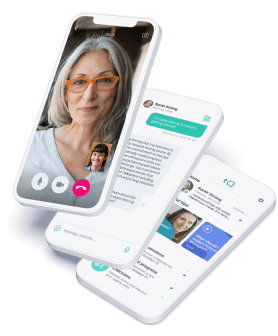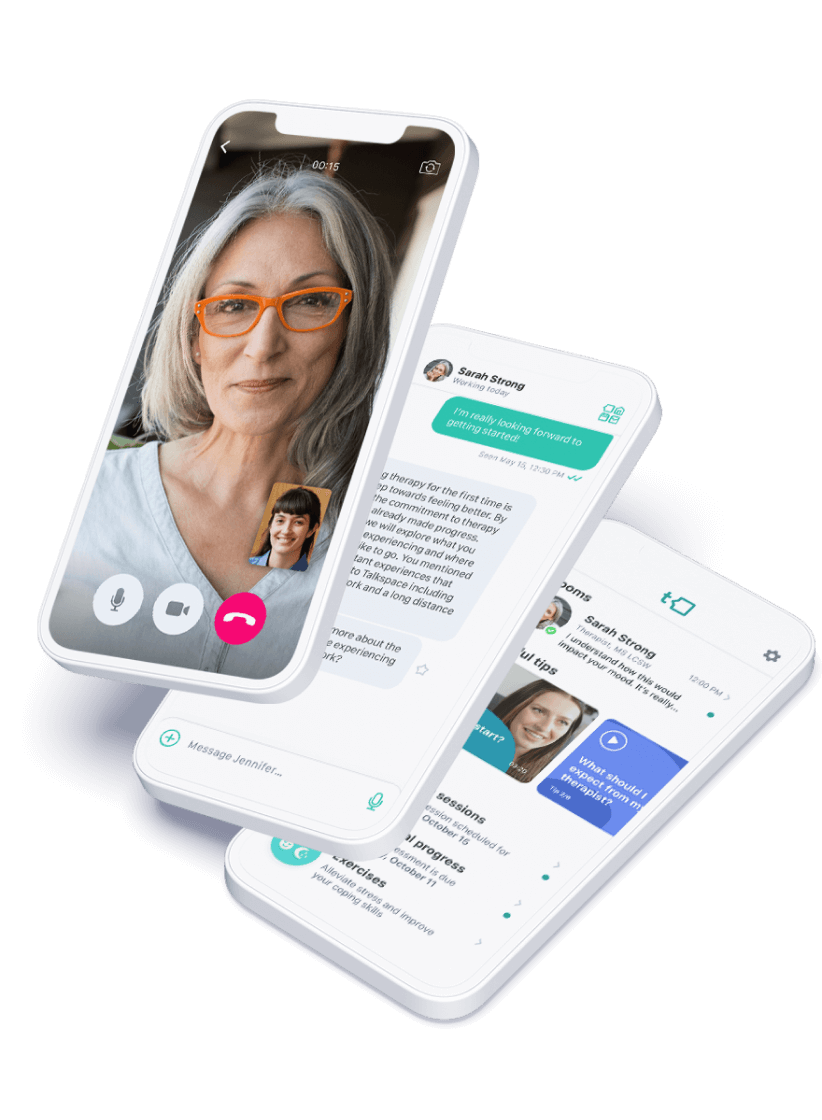Anxiety Disorder
Read Time: 5 MinutesUpdated On: May 16, 2024
Overview
Anxiety can be exhausting. Anyone who’s ever experienced it will tell you that the physical symptoms generalized anxiety disorder can cause — increased heart rate, restlessness, chest pain, difficulty focusing, shortness of breath from anxiety— can leave you feeling wiped out. Sometimes, it feels like no amount of sleep will cure anxiety exhaustion.
It begs the question: does anxiety make you tired? Understanding the link between anxiety and fatigue is crucial for managing both. Keep reading to learn more — why does anxiety make you tired, what does it feel like, and what can you do about it?
Why Does Anxiety Make You Tired?
There are several reasons why anxiety can lead to fatigue. Often, it’s a combination of both physiological and psychological factors that contribute to anxiety exhaustion.
Anxiety causes you to go into a state of heightened alertness known as fight-or-flight mode. This survival instinct naturally releases stress hormones that can impact sleep patterns. Anxiety can also cause physical and mental tension that might lead to headaches and other symptoms that can contribute to tiredness.
Chronic hyperarousal
Chronic hyperarousal is common in anxiety disorders. It keeps you in a constant state of alertness, which can lead to fatigue and further exacerbate other anxiety symptoms.
Stress hormones
When you’re anxious, the body releases stress hormones like cortisol and adrenaline. Although these can be helpful when you’re in survival mode, this chronic stress response can also be overwhelming and negatively impact your ability to regulate energy levels.
Anxiety impacts sleep quality
Anxiety can cause disrupted sleep patterns that make getting adequate rest next to impossible. Whether you struggle to fall asleep, stay asleep, or both, not feeling well-rested can create a vicious cycle where anxiety leads to sleep difficulties, and sleep problems cause more anxiety.
“Studies show that sleep disorders can be a symptom of anxiety. Improving the quality of sleep can lead to better mental health. Therapy can help you examine how your sleeping habits are contributing to your anxiety as well as how anxiety is affecting your sleep.”
Expert Insight
 LCSW, Doctorate of Social Work (DSW) Olga Molina
LCSW, Doctorate of Social Work (DSW) Olga Molina
Constant worry & emotional exhaustion
Mental and emotional exhaustion is more than just draining. It’s virtually impossible to constantly monitor how you’re feeling and what you’re thinking when you have anxiety without eventually burning out and having nothing left to give.
Online therapy for anxiety
Get support for anxiety fast and reach a calmer mindset. Therapy for anxiety is covered by most insurance plans.
What Does Fatigue from Anxiety Feel Like?
Fatigue from anxiety can be overwhelming. Chronic fatigue symptoms can cause tiredness that won’t go away, no matter how much you rest, relax, or sleep. Lack of energy, lack of motivation, and loss of interest in things you once enjoyed can all result.
When you’re experiencing anxiety fatigue, even simple daily tasks and functioning can be exhausting. You might start experiencing physical symptoms, too — increased headaches, weakness, and difficulty concentrating are all common symptoms of anxiety.
How to Deal with Anxiety Fatigue
To effectively deal with anxiety fatigue, a combined approach is best. You’ll need to address the aspects of the physical exhaustion, but you’ll also need to look at the mental component, too — getting to the root cause of the anxiety symptom will help you overcome it.
Focus on sleep hygiene
Establish a healthy, consistent sleep schedule to ensure you get a good night’s rest without any sleep disturbance. There are a variety of things you can do to improve your sleep quality.
TIPS:
- Go to bed at the same time every night
- Wake up at the same time every morning
- Avoid screen time an hour before bed
- Create a relaxing bedtime routine
- Make a comfortable sleep environment
Diet and exercise
Maintain a balanced diet and exercise routine and stay hydrated. Eating well, working out, and drinking enough water seems simple enough, but these habits can be vital to overall well-being (both physical and mental). Diet is intrinsically linked to health, and working out releases endorphins that are proven to enhance mood.
TIPS:
- Eat a nutritious diet of whole grains, lean meats, fresh fruits and vegetables, and minimally processed foods
- Reduce sugar and caffeine intake
- Exercise regularly
- Drink plenty of water every day
Mindfulness practices and relaxation techniques
Practicing mindfulness and using relaxation techniques can reduce fatigue related to anxiety. Powerful coping mechanisms will help calm the mind and improve mood so you can sleep better, avoid sleep problems, and manage all symptoms of anxiety more effectively.
TIPS:
- Do mindful meditation
- Learn and use deep breathing exercises for anxiety
- Journal for anxiety
- Practice yoga
- Do self-care
“Mindfulness practices and relaxation techniques can improve both anxiety and sleep. Techniques such as deep breathing, meditation, and creating a bedtime routine in a relaxing bedroom environment can improve sleep and overall mental health. Reducing your caffeine intake and exercising can also help reduce your anxiety and improve your quality of sleep.”
Expert Insight
 LCSW, Doctorate of Social Work (DSW) Olga Molina
LCSW, Doctorate of Social Work (DSW) Olga Molina
Therapy
Therapy can teach you effective coping tools for managing anxiety symptoms. Cognitive behavioral therapy (CBT) is a type of talk therapy for anxiety that helps you identify unhealthy thought and behavior patterns so you can begin to change them. The process allows you to discover and work through underlying issues that may contribute to your anxiety and cause exhaustion and fatigue.
TIPS:
- Find a therapist who specializes in anxiety
- Practice the skills and tools you learn in between sessions
- Set goals for therapy so you can continue working on self-improvement
- Identify anxiety triggers so you can learn to deal with them
Anxiety medication
Sometimes, anxiety warrants medication. It might be worth considering if your doctor or psychiatrist assesses your symptoms and determines anxiety medication — even short-term — might help you manage your symptoms and improve fatigue.
The following types of drugs may help manage anxiety:
- Selective serotonin reuptake inhibitors (SSRIs)
- Serotonin-norepinephrine reuptake inhibitors (SNRIs)
- Benzodiazepines
- Beta-blockers
Combat Anxiety Fatigue with Treatment
Can anxiety make you tired? In short, yes. Anxiety can cause a wide range of symptoms, including fatigue. Over time, symptoms can worsen and develop into other mental health conditions, like depression. Fortunately, anxiety is highly treatable.
If you experience anxiety fatigue (or any other symptoms that are impacting your life and relationships), take that first step and seek help. Getting professional mental health support will allow you to implement changes that make managing your anxiety and fatigue possible.
Talkspace is an online therapy platform that specializes in treating symptoms of anxiety. Connecting with a Talkspace therapist or psychiatrist can be life-changing. You can get the tools you need to overcome your anxiety and live a full, productive, rich life without being exhausted or having anxiety rule your days.
Connect with a Talkspace mental health provider for an evaluation and online anxiety treatment.
See References
-
Physiology, stress reaction
Chu B. StatPearls [Internet]. September 12, 2022. Accessed March 24, 2024.
-
The effects of acute exercise on mood, cognition, neurophysiology, and neurochemical pathways: A Review
Basso JC, Suzuki WA. Brain Plasticity. 2017;2(2):127-152. doi:10.3233/bpl-160040. Accessed March 24, 2024

Olga Molina is a licensed clinical social worker with approximately 40 years practice experience with diverse populations offering individual, family, and group counseling. Her research and publications focus primarily on divorce, intimate partner violence (women and children), African American and Latinx families, group work, and social work education. Dr. Molina has been in academia for approximately 20 years teaching at the undergraduate and graduate levels on clinical practice with families and groups, and culturally competent practice.
Related Articles About Anxiety Disorder
View all articles
Overcoming Parental Anxiety: Strategies for a Calmer Mind

15 Effective Coping Skills for Anxiety

Acupuncture for Anxiety: Does it Work?

Does Alcohol Cause Anxiety? Exploring the Connection

Agoraphobia vs Social Anxiety Disorder: What’s the Difference?

13 Best Jobs for People with Social Anxiety

Election Anxiety: How to Cope With Political Stress

Social Anxiety vs Autism: How to Tell the Difference

Anxiety & Fatigue: Exploring Why Anxiety Makes You Tired


